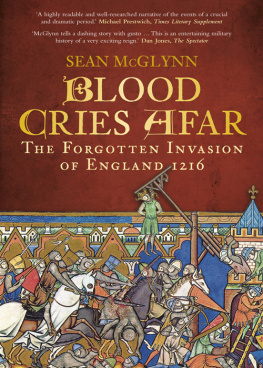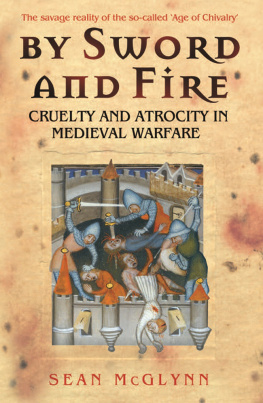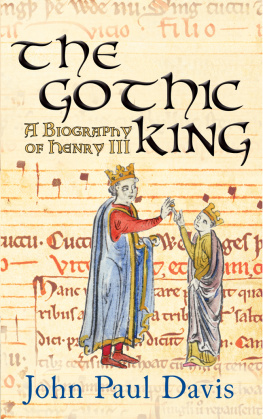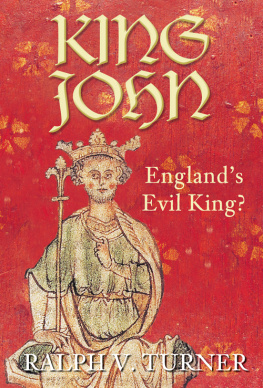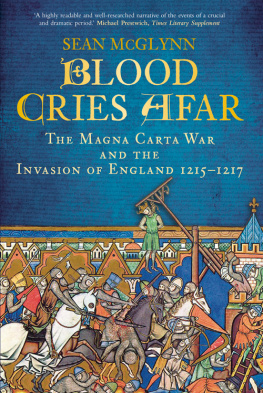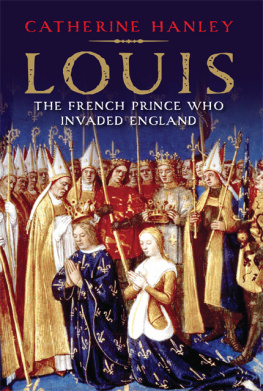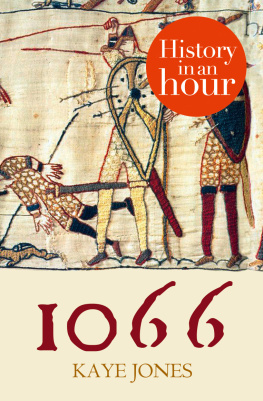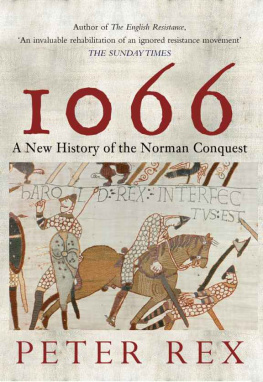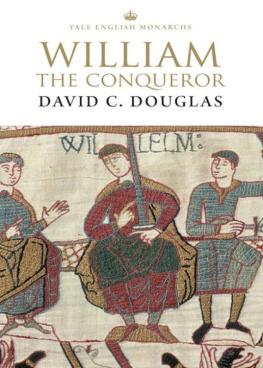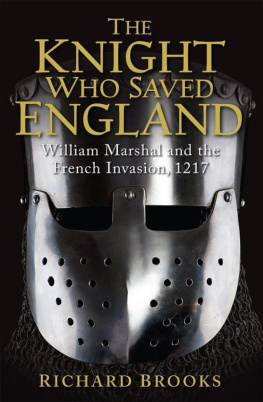1
E NEMIES: T HE
A NGEVIN -C APETIAN S TRUGGLE
Henry II
T hen, at the age of 21, the young Henry Plantagenet ascended the throne of England in December 1154, he established a new royal dynasty, the fame of which ensured its name would echo through the ages. His sons, the Devils brood, included two of Englands most legendary kings, resulting in a succession of three remarkable monarchs from 1154 to 1216. Henry ushered in an age of constitutional and legal changes against a turbulent background of political intrigue, diplomatic manoeuvring and, above all, war. But, first and foremost, he founded the Angevin Empire.
Son of the Empress Matilda, heiress of England, and Geoffrey, Count of Anjou, and grandson of King Henry I of England and Fulk of Anjou, King of Jerusalem, Henry was clearly born for great things; but even his natural ambitions must have been pleasantly exceeded by the relative ease with which he became King of England. One contemporary chronicler wrote: It is astonishing how such great good fortune came to him so fast and so suddenly. What Henry had only partially achieved by military force, fate had finished for him.
By the time of his Christmas coronation in 1154, Henry was already a hugely powerful figure on the European stage: Duke of Normandy, Count of Anjou and, through his inspired marriage to the divorced wife of King Louis VII of France, Duke of Aquitaine and Count of Poitou. This match with Eleanor of Aquitaine had doubled his continental dominions and halved those of King Louis at a stroke. It was an irony of the French kings dissolved marriage that Eleanor had borne him only two daughters a serious, if blameless, failing in any queen but went on to provide her new husband with no less than four sons. However, despite this temporary blip for the French crown, the Capetian dynasty, founded in 987 and from which Louis was the eighth monarch, was notably fortunate in its long unbroken line of direct and relatively undisputed male successions; Louis later went on to produce a son with a new bride. In a manner reminiscent of the Empress Livia in Augustine Rome, she channelled her own ambitions through her male offspring; Henry, Richard, Geoffrey and John. These she turned against her husband, so much so that Henry compared himself to a picture in which an old eagle was being relentlessly harried and pecked by four eaglets.
For two decades Henrys reign was clearly a fruitful one. He re-established order and royal authority in England, leaving himself free to consolidate his continental interests; by 1173 he had accomplished this by becoming overlord of the neighbouring territories of the Vexin, Brittany and Toulouse, a tribute to his formidable diplomatic skills. All were of strategic importance and would prove to be so in the years of war that were to follow. He began the subjugation of Ireland and forged close links with Henry, Duke of Saxony, and also with Navarre and Lombardy. Motivated by King Louis of France, who never failed to meddle in and ferment Angevin familial discord, and by their mother Eleanor, Henrys sons allied themselves with disaffected barons and the King of Scotland in a military strike at the crown. However, a lack of synchronisation and coordination by the rebels doomed their revolt and permitted Henry to deal with and overcome one threat at a time. Henry was magnanimous in victory to his eaglets, but unforgiving of Eleanor: for the rest of Henrys reign, she remained in effective imprisonment.
In 1183 trouble brewed up again. In an acute manifestation of sibling rivalry the young Henry, who held Normandy, Maine and Anjou, allied with his brother Geoffrey, who held Brittany, against Richard, Duke of Aquitaine and their father. The two eldest sons were aided in their task by the new King of France, the eighteen-year-old Philip II. This dangerous instability threatened the Angevin power structure but was removed by the unexpected death from dysentery of the young Henry. Richard thereby became heir to the throne of England and inherited the elder brothers continental lands. Henry II wished to provide for John, his youngest and most favoured son, by giving him Richards duchy of Aquitaine. Richard would have none of this: his many talents were already well established and he successfully countered all moves against him. In 1186 Henry was threatened by Geoffrey, again spurred on by King Philip of France; once again the premature death of a son Geoffrey was killed in a tournament accident saved Henrys position from greater danger. But the last years of Henrys reign witnessed no alleviation of his troubles. The scent of a new order was in the air and the old King found it increasingly difficult to shake off the hereditary hounds. His initially cordial relations with Philip of France broke down into open warfare. At first he was assisted by Richard against the French king, but then opposed by him. Inexplicably, Henry continued to favour John at the expense of Richard, his most gifted son. Prompted by fears for his inheritance and by Philips sly encouragement, Richard joined forces with the French King in a well-organised military campaign against Henry over a battle-ground that was thus prepared for the conflicts of Johns reign. Henry lost Le Mans and Touraine, and hence the struggle. In July 1189 he succumbed to the humiliating terms of Richard and Philip. Two days after signing his defeat, sick in heart and body, Henry died.
Richard I
True to the ever-changing nature of medieval alliances, when Richard became King of England the familiar pattern of Angevin-Capetian rivalry was renewed afresh, barely restrained even by their combined leadership of the Third Crusade (11902). Whatever King Philip had learned from the military genius of Richard in the Holy Land, he could not put it to effective use against him back in Europe, for Richard usually bettered the French King at war. Philip had returned home early from the crusade, making much of an illness that was afflicting him (arnoldia), but in reality his purpose was to lay claim to his inheritance of the county of Flanders, using the opportunity to make gains on Richards continental territories in the English kings absence; he was not overly deferential to the protection afforded by the Papacy to crusaders lands. This was about the only time that Philip made any real sustained headway against Richard; and what progress he did make was often in collusion with John, Richards treacherous younger brother. On his return, Richard soon made good any losses he had incurred while in the Holy Land or while incarcerated by Henry VI of Germany.
Richard was adored by contemporaries for the chivalric hero he was; the judgment of historians has proved, until recently at least, to be more censorious, one damning him as A bad son, a bad husband, a selfish ruler, and a vicious man.
A further, neglected but extremely positive aspect is suggested here. Richards victories abroad, brought about by his active involvement in warfare, denoted greater security for England, not less. One only has to examine Johns pitiful record on the continent which we will soon be doing to witness the consequences of military defeat there, when unsuccessful campaigns were invariably followed by threats of invasion. In 1216 these threats were put into operation and became frighteningly real after heavy English losses in France. It has always been Britains strategy to fight its wars on foreign soil, thereby preventing conflict on home territory. This strategy is widely understood in the more modern context of the Napoleonic wars of the early nineteenth century and the world wars of the twentieth century. Thus one historian of the Napoelonic wars has written for the early nineteenth century that in one sense Britains defences began east of the Rhine with her Continental allies. Military dependence kept drawing Britain into European affairs. The fleet of 1386 gathered near Damme, in exactly the same place where the French King Philip Augustus had gathered his invasion fleet in 1213. Had John been as successful as Richard in his continental wars, then Philip would not have been in a position to pose this threat then or for his son to make the threat a reality three years later in 1216. This is the overlooked vindication for Richards policy of fighting his wars abroad. This book will show how Johns military failures combined with his political ones to leave England exposed to invasion.

